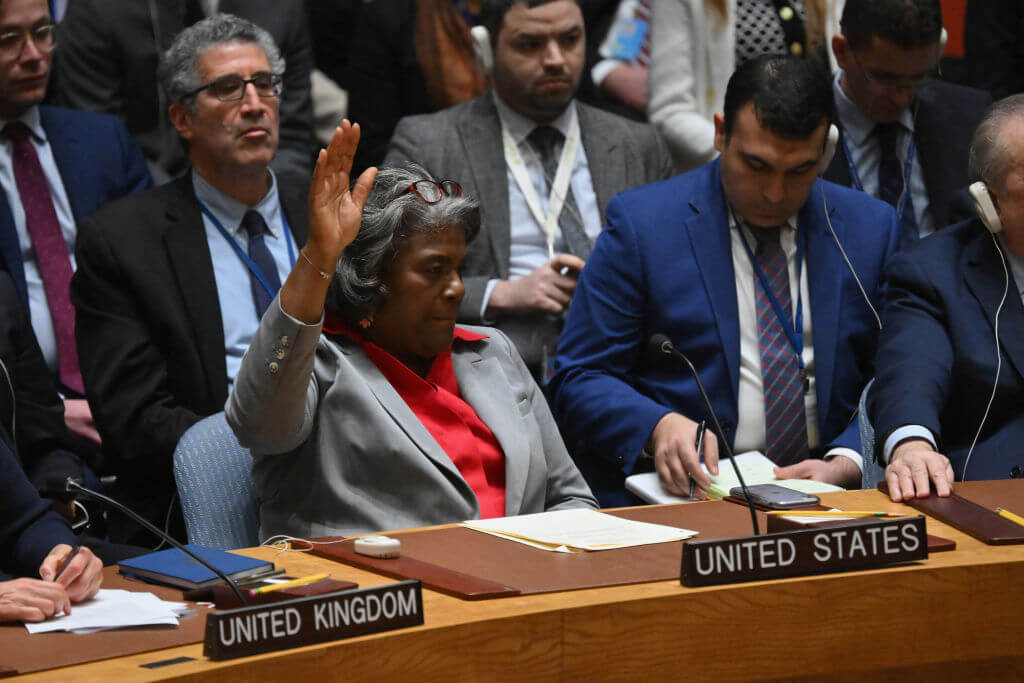In a first, US withholds its veto and abstains from UN ceasefire resolution
After the vote, Netanyahu cancelled the planned visit of a high-ranking Israel delegation for talks with the White House over an impending military operation in Rafah

U.S. Ambassador to the United Nations Linda Thomas-Greenfield abstains during vote on a resolution calling for an immediate ceasefire in Gaza March 25. Photo by Angela Weiss/AFP via Getty Images
Tensions between President Joe Biden and Israeli Prime Minister Benjamin Netanyahu intensified Monday after the U.S., which has consistently vetoed U.N. Security Council resolutions demanding a ceasefire in Gaza, abstained instead.
The resolution introduced Monday, by non-permanent members of the U.N. body, including Algeria and Mozambique, called for an immediate ceasefire during the Muslim holy month of Ramadan that would lead to a permanent ceasefire. It also demanded the immediate and unconditional release of all hostages.
After the vote, Netanyahu cancelled the planned visit of a high-ranking Israeli delegation for talks with the White House over an impending military operation in Rafah, a Gaza city where about a million Palestinians are sheltering. Biden requested the delegation — led by Israel’s Strategic Affairs Minister Ron Dermer and National Security Adviser Tzachi Hanegbi — meet in Washington, D.C. to discuss U.S. concerns about the operation and alternatives.
Benny Gantz, Netanyahu’s senior war cabinet partner, echoed the prime minister’s criticism of the U.S. decision to abstain, but said it was critical to continue to engage with the administration.
Monday’s resolution comes days after Russia and China vetoed a U.S. proposal for a six-week ceasefire linked to a hostage deal and that also condemned Hamas. The U.S. abstention allowed the Security Council’s first ceasefire resolution to pass, after vetoes had sunk four previous resolutions.
It also reflects the Biden administration’s increasing frustration with Netanyahu.
Rising US-Israeli tensions
In recent weeks, the administration has clashed with Netanyahu over a planned Israeli military operation in Rafah, and his reluctance to discuss a postwar strategy to solve the Israeli-Palestinian conflict.
The U.S. abstention and Netanyahu’s cancellation of the meeting mark the most serious breach between the two countries since the war’s onset, but neither has gained for digging in its heals, said Aaron David Miller, a longtime U.S. expert on the Israeli-Palestinian conflict. “Both sides wanted to make a point, not a difference.”
The consensus among Miller and other commentators is that Netanyahu, to play to his right-wing base, snubbed Biden by scrapping a meeting personally requested by him. But trying to undermine a U.S. president doesn’t serve Israel’s interests, continued Miller, a senior fellow at the Carnegie Endowment for International Peace. At the same time, the abstention — on a resolution that did not actually call for the end of a war Israel wants to continue — won’t change anything on the ground, he said. “Today was not anybody’s finest hour.”
Also on Monday, Senators Lindsey Graham (R-South Carolina), Kirsten Gillibrand (D-New York), Katie Britt (R-Alabama), Susan Collins (R-Maine), Richard Blumenthal (D-Connecticut), and Joni Ernst (R-Iowa) introduced a Senate resolution calling on the United Nations Security Council to open a formal investigation into acts of sexual violence committed during and after Hamas’ Oct 7. attack on Israel.
A shift in US policy?
The White House is reportedly debating whether to place restrictions on arms sales to Israel. Last week, Senate Majority Leader Chuck Schumer called for new elections after the war in Gaza winds down.
And U.S. Ambassador Linda Thomas-Greenfield praised Monday’s ceasefire resolution, even though the U.S. abstained from voting on it. “The U.S. fully supports these critical objectives,” she said. “In fact, they were the foundation of the resolution we put forward last week.”
Thomas-Greenfield added that the fighting in Gaza, in which more than 32,000 Palestinians have been killed, according to Gaza’s health ministry, could have been prevented weeks ago if Hamas laid down its arms.
John Kirby, a National Security Council spokesperson, said in a briefing with reporters that the abstention “does not represent a shift” in U.S. policy on the war. “We have been consistent in our support for a ceasefire as part of a hostage deal.” The U.S. did not support the resolution, he continued, because it did not condemn Hamas and tie the pause in fighting to a negotiated settlement.
“There’s no reason for this to be seen as some sort of escalation” between Biden and Netanyahu, he added.
Vice President Kamala Harris on Sunday said there could be “consequences” for Israel if it moves ahead with the Rafah operation. “We have been clear in multiple conversations and in every way that any major military operation in Rafah would be a huge mistake,” Harris said in an interview with ABC News.















